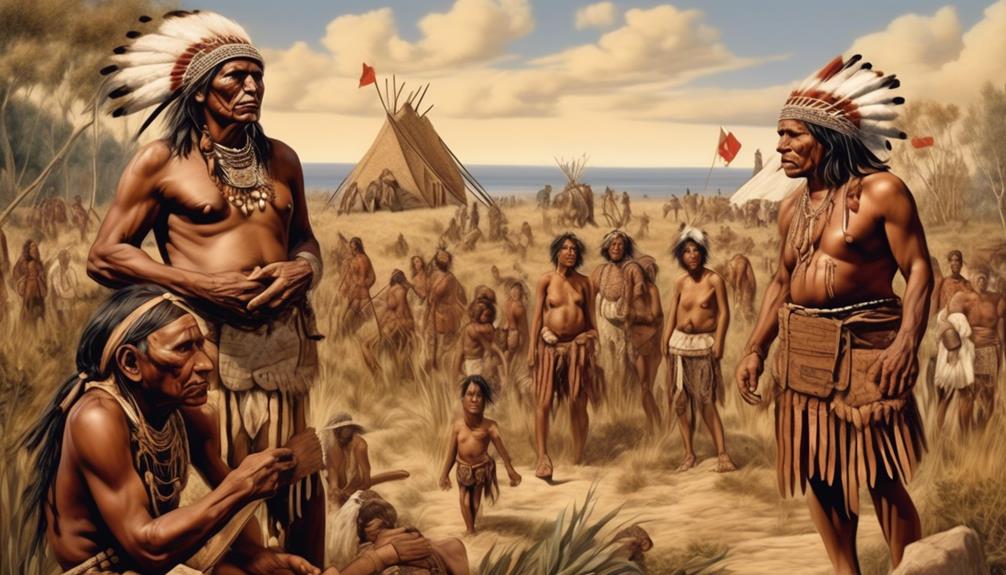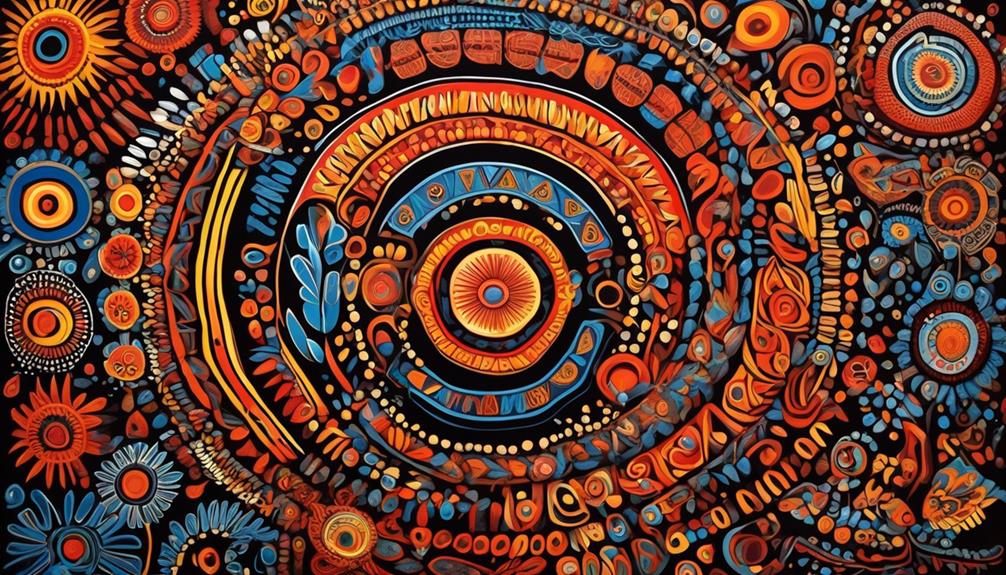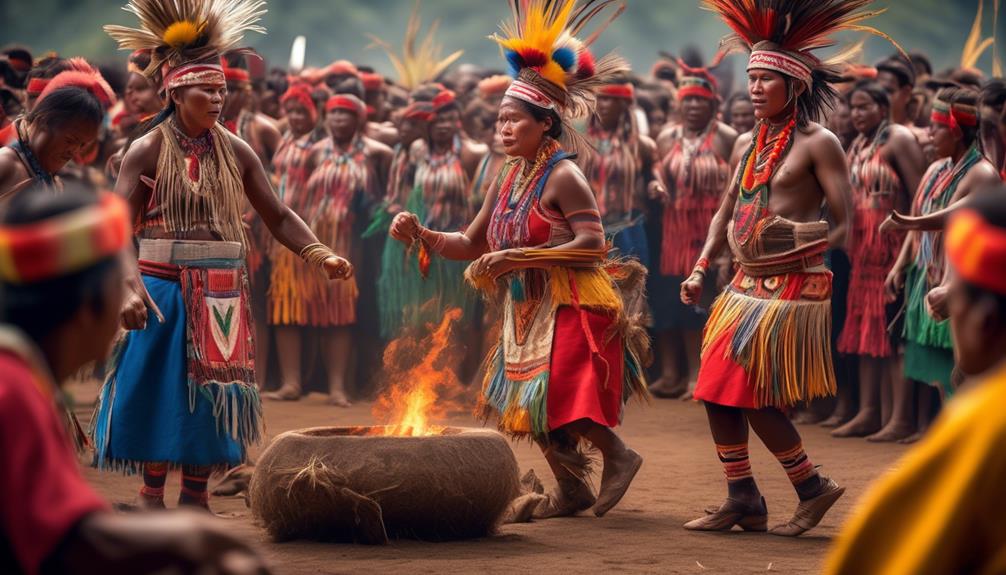When analyzing the impact Europe had on Indigenous populations, it is important to recognize the stark contrast between the diverse array of native cultures and the forceful imposition of European customs and rules.
The interplay between these two forces has had profound and lasting effects on the lives of Aboriginal peoples, shaping their identities and shaping their future in ways that continue to resonate today.
This complex interaction raises questions about the nature of cultural exchange, power dynamics, and the enduring legacy of colonialism.
Key Takeaways
- European settlers displaced and dispossessed Aboriginal peoples from their traditional lands, causing enduring mental and emotional trauma.
- The imposition of European cultural norms and values led to the erosion of traditional practices, languages, and belief systems among Aboriginal peoples.
- Labor exploitation and unequal distribution of wealth from resource extraction perpetuated poverty and hindered the development of Aboriginal communities.
- The introduction of new diseases, inadequate living conditions, and limited access to healthcare have had significant health impacts on Aboriginal peoples.
Historical Displacement and Dispossession
Historically, European settlers displaced and dispossessed Aboriginal peoples from their traditional lands, leading to significant social, cultural, and economic impacts on Indigenous communities. The displacement trauma caused by the forced removal from ancestral territories has had enduring effects on the mental and emotional well-being of Aboriginal peoples. The loss of land hasn't only disrupted their traditional ways of life but has also led to a profound sense of disconnect from their cultural and spiritual roots. This dislocation has resulted in a deep-seated trauma that has been passed down through generations, impacting the overall mental health of Indigenous communities.
Furthermore, the land loss has had profound economic consequences, as it severed the connection between Aboriginal peoples and their primary means of sustenance and economic activity. The disruption of traditional hunting, fishing, and agricultural practices has led to economic hardships and a loss of self-sufficiency within Indigenous communities.
The ramifications of this historical displacement and dispossession are far-reaching, with ongoing efforts needed to address the deep-seated trauma and to restore the connection between Aboriginal peoples and their traditional lands.
Cultural Assimilation and Loss
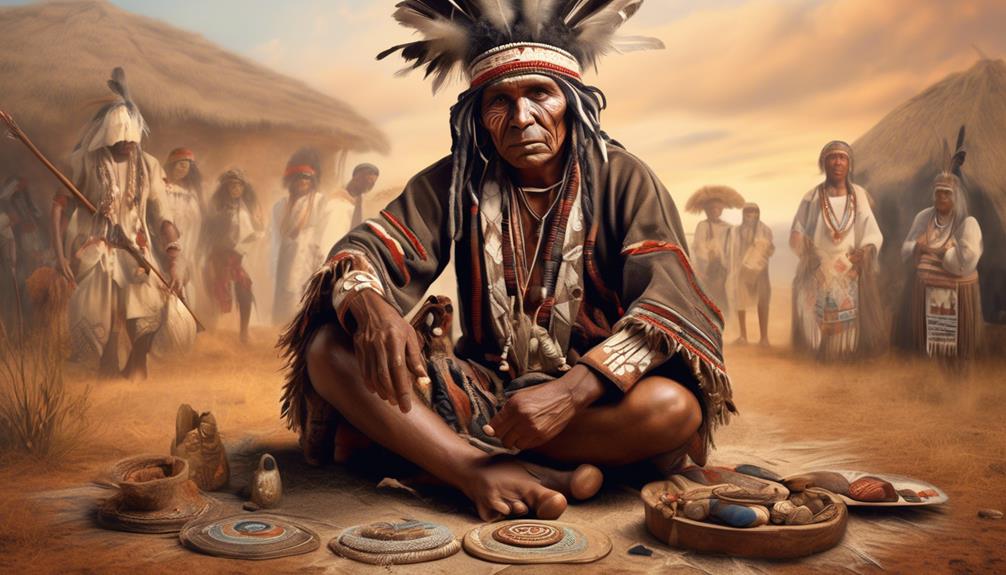
The displacement and dispossession experienced by Aboriginal peoples due to European settlement have had a profound impact on their cultural identity, contributing to the process of cultural assimilation and loss. The imposition of European cultural norms and values, alongside policies aimed at assimilating Aboriginal peoples into the dominant European society, has led to the erosion of traditional practices, languages, and belief systems. This has resulted in a significant loss of cultural heritage and identity for many Aboriginal communities.
The forced removal of children from their families and communities, a practice prevalent in many European settler colonies, further disrupted the intergenerational transmission of cultural knowledge and traditions, perpetuating the cycle of cultural loss.
The struggle for cultural preservation and identity formation in the face of such adversity is a testament to the resilience and determination of Aboriginal peoples. Efforts to revitalize traditional languages, customs, and spiritual practices are essential in reclaiming and preserving cultural heritage.
However, the lasting impact of cultural assimilation and loss underscores the need for ongoing support and recognition of Aboriginal rights to self-determination and cultural autonomy.
Economic Exploitation and Inequality
Economic exploitation and inequality have had a pervasive and enduring impact on the socio-economic well-being of Aboriginal peoples, perpetuating systemic disparities that continue to shape their lived experiences. The historical labor exploitation of Aboriginal peoples, often in industries such as agriculture and mining, has contributed to a cycle of poverty within their communities. Additionally, the unequal distribution of wealth resulting from resource extraction has further deepened economic disparities. This systemic economic exploitation has hindered the ability of Aboriginal peoples to accumulate wealth and has perpetuated intergenerational poverty.
| Exploitation | Poverty | Inequality |
|---|---|---|
| Labor | Intergenerational | Wealth |
| Resource | Economic | Socio-economic |
| Disparities | Disadvantages |
The consequences of this economic exploitation are far-reaching, affecting access to quality education, healthcare, and employment opportunities. Furthermore, the resulting wealth inequality has limited the capacity of Aboriginal communities to invest in their own development and has perpetuated their marginalization within the broader society. It is imperative to acknowledge and address these historical injustices to foster a more equitable and inclusive future for Aboriginal peoples.
Health Impacts and Epidemics
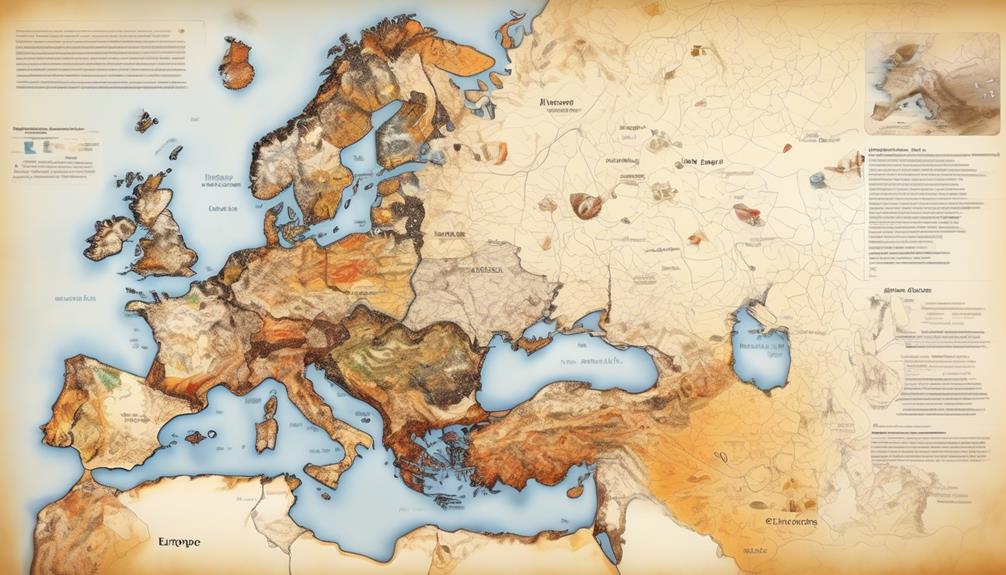
Despite the rich diversity of Aboriginal cultures and traditions, the impact of Europe on their health has been profound and enduring. The introduction of new diseases, forced relocations, and the disruption of traditional healing practices have had lasting effects on the well-being of Aboriginal peoples.
- Introduction of New Diseases: The arrival of Europeans brought diseases such as smallpox, influenza, and measles, to which Aboriginal peoples had little to no immunity. This led to devastating epidemics that decimated populations.
- Forced Relocations: The displacement of Aboriginal communities from their traditional lands and the imposition of inadequate living conditions in reserves or missions contributed to increased health risks and limited access to healthcare services.
- Disruption of Traditional Healing Practices: The suppression of traditional healing practices and spiritual ceremonies by European colonizers not only undermined cultural identity but also deprived Aboriginal peoples of holistic approaches to health and well-being.
- Intergenerational Trauma: The trauma inflicted by the loss of family members, culture, and land due to European colonization continues to impact the mental and emotional health of Aboriginal communities across generations.
- Challenges in Public Health: The persisting disparities in access to quality healthcare, clean water, and adequate sanitation contribute to ongoing health challenges in many Aboriginal communities.
The enduring effects of these historical injustices highlight the importance of addressing intergenerational trauma and working towards equitable public health policies for Aboriginal peoples.
Legal Injustices and Human Rights Abuses
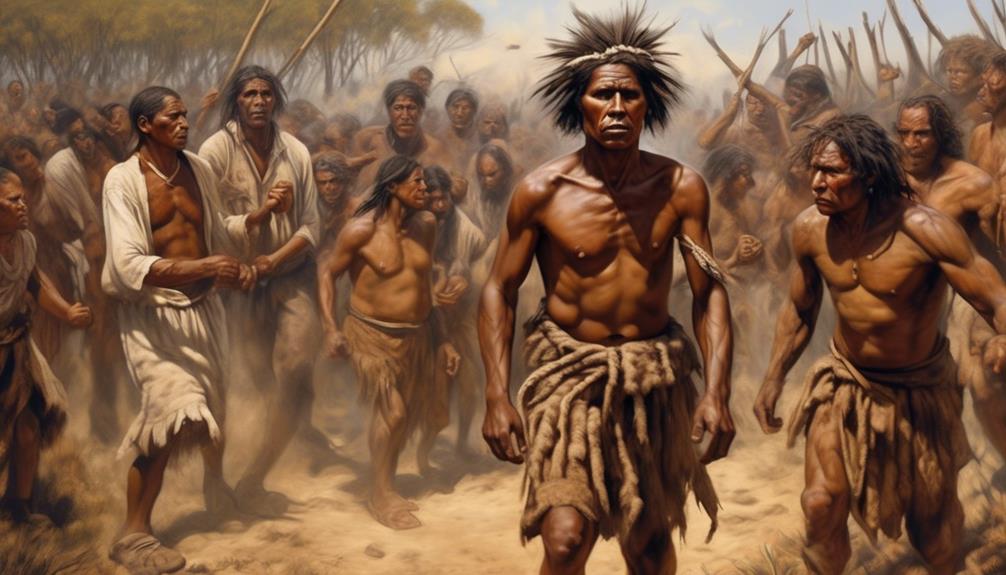
Upon their arrival, Europeans implemented legal systems that systematically marginalized and oppressed Aboriginal peoples, perpetuating human rights abuses that continue to impact these communities today.
The denial of land rights has been a central issue, with Europeans forcibly taking control of Aboriginal lands and resources, often without consent or compensation. This dispossession has had far-reaching consequences, disrupting traditional ways of life and severing the deep spiritual and cultural connections to the land. The legacy of this injustice persists, as many Aboriginal communities continue to fight for the recognition and protection of their land rights.
Systemic discrimination within the legal framework further exacerbated the human rights abuses experienced by Aboriginal peoples. Discriminatory laws and policies, such as the forced removal of children from their families and communities, known as the Stolen Generations, and the imposition of restrictive reserves and missions, have had profound and enduring effects on Aboriginal societies. These actions not only violated fundamental human rights but also inflicted intergenerational trauma and social dislocation.
The ongoing struggle for justice and redress underscores the enduring impact of legal injustices and human rights abuses on Aboriginal peoples.
Frequently Asked Questions
How Did European Colonization Impact the Spiritual Beliefs and Practices of Aboriginal Peoples?
European colonization deeply impacted the spiritual beliefs and practices of Aboriginal peoples, leading to cultural assimilation and loss of traditional knowledge.
The introduction of Christianity and forced conversion disrupted indigenous spiritual systems. Sacred sites were desecrated, and ceremonies were banned.
This caused a profound spiritual and cultural trauma that continues to affect Aboriginal communities today. The impact on spirituality and cultural assimilation can't be understated, and it's essential to acknowledge and address these historical injustices.
What Specific Diseases Were Introduced by European Settlers and How Did They Impact Aboriginal Populations?
The impact of diseases introduced by European settlers on Aboriginal populations was devastating. Smallpox, measles, and influenza caused widespread suffering and death among Indigenous communities.
The introduction of these diseases had a profound and tragic impact on the Aboriginal populations, leading to significant population decline and disruption of traditional ways of life.
The devastating effects of these diseases highlight the destructive consequences of European colonization on the health and well-being of Aboriginal peoples.
How Have European Legal Systems Affected the Traditional Governance Structures of Aboriginal Communities?
When European legal systems intersect with traditional governance structures of Aboriginal communities, the impact can be profound. These systems can challenge the autonomy and self-governance that are integral to the spiritual and cultural practices of Indigenous peoples.
The clash between European legal frameworks and traditional beliefs can disrupt the harmonious functioning of Aboriginal governance structures, causing a loss of self-determination and cultural integrity.
What Role Did European Missionaries Play in the Cultural Assimilation of Aboriginal Peoples?
European missionaries played a significant role in the cultural assimilation of aboriginal peoples. Their influence often led to the erosion of traditional customs and beliefs. This resulted in a loss of cultural identity for many indigenous communities.
Missionaries sought to impose European values and religious practices, leading to a transformation of aboriginal societies. The impact of missionary activities on cultural assimilation can't be overlooked when examining the effect of Europe on aboriginal peoples.
How Did European Economic Policies Contribute to the Loss of Traditional Lands and Resources for Aboriginal Communities?
European economic policies had a significant impact on the economic displacement and cultural assimilation of aboriginal communities. Through practices like land enclosures and resource extraction, traditional lands were lost, leading to economic instability and cultural disruption.
This forced many to adopt European economic systems, often at the expense of their own traditions and practices. The resulting loss of autonomy and self-sufficiency further marginalized aboriginal peoples, perpetuating a cycle of economic and cultural oppression.
Conclusion
In conclusion, the effect of Europe on Aboriginal peoples has been one of historical displacement and dispossession. Cultural assimilation and loss have also been significant impacts. Additionally, economic exploitation and inequality, health impacts and epidemics, as well as legal injustices and human rights abuses have been prevalent. These impacts have shaped the lives of Aboriginal peoples for centuries, leading to ongoing challenges and struggles for cultural preservation and social justice.
The lasting effects of European colonization continue to shape the experiences of Aboriginal peoples today.
